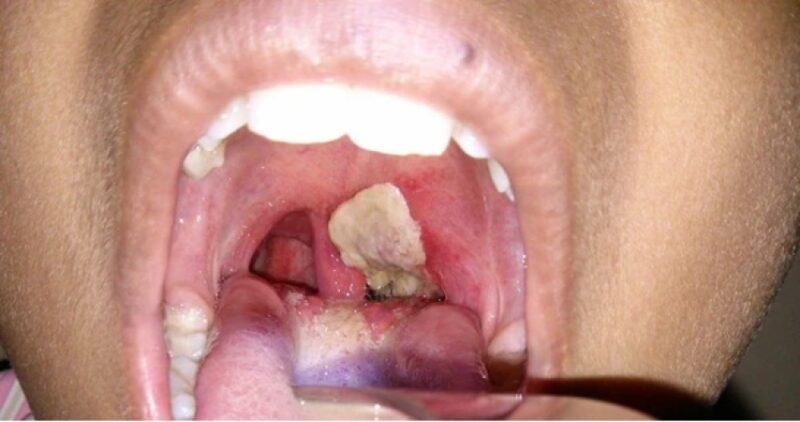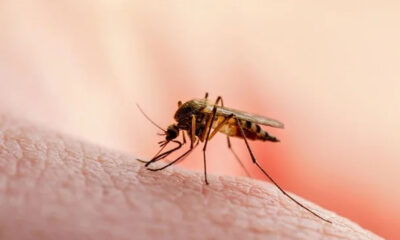Health
Nigeria misses out as 18m doses of first-ever malaria vaccine arrive in Africa

Nigeria misses out as 18m doses of first-ever malaria vaccine arrive in Africa
18 million doses of the first-ever malaria vaccine (RTS,S/AS01) will be given to 12 nations in various parts of Africa between 2023 and 2025.
This was revealed on Wednesday in a joint press statement by GAVI, the Vaccine Alliance, World Health Organization and United Nation Children’s Fund.
The RTS,S/AS01 vaccine is the first vaccine recommended for use by the World Health Organisation to prevent malaria in children in areas of moderate to high malaria transmission.
“Since 2019, Ghana, Kenya, and Malawi have been delivering the malaria vaccine through the Malaria Vaccine Implementation Programme, coordinated by WHO and funded by Gavi, the Global Fund to Fight AIDS, Tuberculosis and Malaria, and Unitaid.
“The RTS,S/AS01 vaccine has been administered to more than 1.7 million children in Ghana, Kenya, and Malawi since 2019 and has been shown to be safe and effective, resulting in a substantial reduction in severe malaria and a fall in child deaths. At least 28 African countries have expressed interest in receiving the malaria vaccine.
READ ALSO:
- N1,000 POC on vehicles is double taxation- Lagos Lawyer
- Lagos recorded 111 defilement cases in 3 months – Police
- Resident doctors give FG two weeks to implement 200% salary raise
“In addition to Ghana, Kenya, and Malawi, the initial 18 million dose allocation will enable nine more countries, including Benin, Burkina Faso, Burundi, Cameroon, the Democratic Republic of the Congo, Liberia, Niger, Sierra Leone, and Uganda, to introduce the vaccine into their routine immunization programmes for the first time, ” the statement read in part.
The statement noted that this allocation round makes use of the supply of vaccine doses available to Gavi via UNICEF, stating that the first doses of the malaria vaccine are expected to arrive in the selected countries during the last quarter of 2023 while the countries will start to roll them out by early 2024.
The allocations, according to the report, were made using the framework for allocating the limited supply of malaria vaccine, which prioritizes those doses to areas with the greatest need and the greatest risk of malaria disease and child mortality.
The Managing Director of Country Programmes Delivery at Gavi, Thabani Maphosa, said the vaccine has the potential to be very impactful in the fight against malaria, and when broadly deployed alongside other interventions, “it can prevent tens of thousands of future deaths every year.”
READ ALSO:
- EFCC convicts two for Crypto, Facebook scam in Abuja
- Kano anti-corruption agency confirms authenticity of Ganduje dollar videos
- Police dismiss killer cop Kabiru Odejimi, to arraign him on July 7
Maphosa added, “While we work with manufacturers to help ramp up supply, we need to make sure the doses that we do have are used as effectively as possible, which means applying all the learnings from our pilot programmes as we broaden out to a new total of 12 countries.”
Malaria remains one of Africa’s deadliest diseases, killing nearly half a million children each year under the age of five, and accounting for approximately 95 percent of global malaria cases and 96 per cent of deaths in 2021.
According to the UNICEF Associate Director of Immunisation, Ephrem Lemango, “Nearly every minute, a child under five years old dies of malaria.”
Lemango revealed that “For a long time, these deaths have been preventable and treatable; but the roll-out of this vaccine will give children, especially in Africa, an even better chance at surviving. As supply increases, we hope even more children can benefit from this life-saving advancement.”
The WHO Director of Immunisation, Vaccines and Biologicals, Dr Kate O’Brien, said the malaria vaccine was a breakthrough to improve child health and child survival; and families and communities.
“This first allocation of malaria vaccine doses are prioritised for children at the highest risk of dying of malaria. The high demand for the vaccine and the strong reach of childhood immunisation will increase equity in access to malaria prevention and save many young lives. We will work tirelessly to increase supply until all children at risk have access,” O’Brien said.
Nigeria misses out as 18m doses of first-ever malaria vaccine arrive in Africa
Health
Nigerian doctor pioneers W’Africa first robotic prostate cancer surgery

Nigerian doctor pioneers W’Africa first robotic prostate cancer surgery
A Nigerian Consultant Urological/Robotic Surgeon, Professor Kingsley Ekwueme on Monday in Lagos pioneered the first West African robotic surgery on a prostrate cancer patient.
Ekwueme, a UK-based medical doctor returnee recently established The Prostate Clinic, (TPC) Nigeria Centre for Robotic and Laparoscopic Surgery, the first super-specialised clinic in West Africa dedicated to the diagnosis and treatment of prostate cancer, utilising cutting-edge robotic surgery.
“This is truly historic,” declared Ekwueme, the clinic’s founder.
“We are bringing technology that has never been seen before in this region, giving Nigerians access to world-class treatment right here at home.”
The clinic’s centerpiece is the Da Vinci Robot, an advanced surgical system that provides unparalleled precision and minimally invasive procedures. “
Briefing journalists on the feat, Ekwueme explained that: “The Da Vinci Robot offers three-dimensional imaging and seven degrees of freedom, allowing for surgeries with minimal blood loss and faster recovery times.”
“Patients experience significantly less pain and scarring compared to traditional open surgeries.”
Ekwueme, a renowned urologist, emphasised that the technology extends beyond prostate cancer.
“We are treating a range of urological conditions in both men and women, including kidney cancer, bladder cancer, kidney stones, and benign prostatic hyperplasia. Our goal is to transform surgery in Nigeria.”
READ ALSO:
- How 12 inmates escape in Kogi jailbreak – Prison spokesman
- Fubara: Supreme Court reacts to photo of Justice Agim with Wike
- Aviation workers threaten nationwide airports shutdown over Customs officer assault
Noting that the key focus of the clinic was accessibility, he said he is determined to make these advanced procedures affordable for all Nigerians.
“My mission is to ensure that no one in this country dies needlessly due to a lack of access to quality care.
“We are working to make these procedures as cost-effective as possible, and we are open to partnerships with the government to expand our reach.”
To address Nigeria’s power challenges, the clinic is equipped with a comprehensive solar power system, ensuring uninterrupted operations. “We understand the importance of reliable power.
“Our 24-hour solar system ensures that we can provide consistent, high-quality care.”
He said he is also committed to training local medical professionals in robotic surgery, ensuring the long-term sustainability of the technology in Nigeria.
“We are investing in the future of Nigerian healthcare. We want to empower our doctors with the skills they need to provide world-class care.”
Debunking common misconceptions about prostate and sexual activities, Ekwueme clarified that there is no proven dietary prevention for prostate cancer. “The primary risk factors are age, race, and family history. Early detection and access to advanced treatment are crucial.”
Looking ahead, Ekwueme revealed plans to introduce groundbreaking technology for benign prostatic hyperplasia (BPH) with zero blood loss.
“I am doing a procedure tomorrow, and soon I will unveil a technology that has never been done in Africa, splitting the prostate from the inside with absolutely no blood loss,” he stated.
He said with its state-of-the-art technology, commitment to affordability, and focus on local training, The Prostate Clinic Nigeria Centre for Robotic and Laparoscopic Surgery is poised to revolutionise cancer care in West Africa, offering hope and advanced treatment options to countless Nigerians.
Nigerian doctor pioneers W’Africa first robotic prostate cancer surgery
Health
FG destroys another 200 containers of expired drugs

FG destroys another 200 containers of expired drugs
The Federal Government Joint Committee on the destruction of fake, illicit and expired pharmaceuticals has destroyed another 200 containers of substandard drugs worth billions of Naira imported into the country through the Apapa and Tin-Can Island seaports.
This is coming after the committee initially destroyed 250 containers of the same expired pharmaceutical products in January, 2025.
To this end, the committee comprising the Nigerian Customs Service (NCS), National Security Adviser (NSA), National Drug Law Enforcement Agency (NDLEA), National Agency for Food Drugs Administration and Control (NAFDAC) and Nigerian Army has destroyed a total of 450 containers of expired drugs in the first quarter of 2025.
The destruction exercise which took place in Epe, Lagos State yesterday, was part of a broader initiative of the Federal Government to curb importation of illicit and controlled drugs in order to safeguard public health and curb drug-related crimes in the country.
The pharmaceuticals destroyed were Tramadol, codeine, Apetamine, and Analgin injection amongst others.
Speaking to newsmen, the National Security Adviser (NSA), Mallam Nuhu Ribadu, said the initiative was important to prevent the circulation of dangerous substances such as Tramadol and Codeine, which are often abused, thus contributing to criminal activities in the country.
READ ALSO:
- Rivers court bars woman from answering ex-husband’s name
- PDP gives condition to back Atiku, Obi, El-Rufai in 2027
- Gov Fubara’s suspension dents Nigeria’s image, says ex-President Jonathan
Mallam Ribadu, who was represented by Ibrahim Sulaiman, said the destroyed drugs were seized at Apapa, Tin Can, and Lekki seaports.
He, however, disclosed that similar destruction was conducted in Port Harcourt as part of the first phase.
“The National Security Adviser is very passionate about ensuring that these illicit drugs do not remain in circulation. The government will not allow perpetrators to act with impunity; they will be arrested and prosecuted,” he stated.
The intercepted drugs were either expired or classified as controlled substances that should only be used under strict medical supervision.
Also, the Assistant Customs Controller, A.O Oguntuase from FOU Zone A, emphasised the enforcement efforts of security agencies in tracking and intercepting these illegal imports.
“Through intelligence gathering and swift action, we have been able to prevent the distribution of these drugs.
“The value of the destroyed substances is enormous, with each container estimated to be worth close to a billion naira,” he said.
On his part, representative of the NDLEA, DC Omotosho Solomon, stated that suspects arrested in connection with the goods were being tried in court.
Solomon warned importers engaged in the trafficking of illicit drugs and pharmaceuticals to desist from such acts or face the full process of law on illegal importation.
FG destroys another 200 containers of expired drugs
Health
1,319 died of Diphtheria in Nigeria, says NCDC

1,319 died of Diphtheria in Nigeria, says NCDC
The Nigeria Centre for Disease Control and Prevention (NCDC) has confirmed that the ongoing diphtheria outbreak in the country has claimed 1,319 lives.
The alarming figure was disclosed in the latest situation report from the National Diphtheria Emergency Operations Centre (EOC), published on the agency’s official website.
Diphtheria, a highly contagious bacterial infection caused by Corynebacterium diphtheriae, primarily affects the mucous membranes of the throat and nose.
The bacteria produce a dangerous toxin that can cause severe complications such as breathing difficulties, heart failure, and nerve damage.
According to the NCDC, more than 42,000 suspected cases have been recorded across 37 states since 2022. The latest report covers epidemiological week 10 of 2025 and highlights ongoing challenges in controlling the outbreak, including low vaccination coverage, inadequate laboratory capacity, and delays in confirming cases,” the agency stated.
Kano State accounts for 75% of confirmed cases, with 18,108 out of 25,812 recorded in the country. Other high-burden states include Bauchi with 2,334 cases, Yobe with 2,408 cases, and Katsina with 1,501 cases.
READ ALSO:
- TUC backs NYSC member for criticising Tinubu administration
- Governors lobby Tinubu over direct allocation to LGAs
- Peace deal must bar Ukraine from Nato, Russian official says
Out of the 42,642 suspected cases reported, 25,812, or 60.5%, have been confirmed, including 396 laboratory-confirmed cases, 216 epidemiologically linked cases, and 25,200 clinically compatible cases. A total of 7,769 cases, representing 18.2%, have been discarded, while 3,591 cases, or 8.4%, remain pending classification. Another 5,470 cases, making up 12.8%, have an unknown classification.
The confirmed cases are spread across 184 Local Government Areas in 26 states. Kano, with 18,108 cases, has the highest number, followed by Bauchi with 2,334 cases, Yobe with 2,408 cases, Katsina with 1,501 cases, Borno with 1,161 cases, Jigawa with 53 cases, Plateau with 119 cases, and Kaduna with 44 cases. These states together account for 99.7% of all confirmed infections.
The NCDC reported that the overall case fatality rate stands at 5.1%, meaning that one in every 20 confirmed cases results in death. However, some states have recorded significantly higher mortality rates. Kaduna has a fatality rate of 58%, Plateau 48%, Lagos 83 per cent, and Adamawa 80%.
In the latest reporting week, 23 new suspected cases were identified, 20 in Lagos and three in Katsina. However, none have yet been confirmed, with 56.5% of cases still unclassified due to delays in laboratory testing.
To curb the outbreak, the NCDC stated that the federal government has launched reactive vaccination campaigns in high-burden states and intensified community engagement efforts, particularly through traditional and religious leaders.
The agency urged the public to ensure they are vaccinated and to seek medical attention immediately if they experience symptoms such as sore throat, fever, or difficulty breathing.
1,319 died of Diphtheria in Nigeria, says NCDC
-

 metro2 days ago
metro2 days agoCourt refers Ojukwu property case to alternative dispute resolution
-

 metro18 hours ago
metro18 hours agoAttack on Mufty of Ilorin: Onikijipa Family Charges Stakeholders to Call Sheikh Habibullahi Al-Ilory to Order
-

 Entertainment3 days ago
Entertainment3 days agoSome ladies in movie industry ready to sleep their way to fame — Jide Kosoko
-

 Health24 hours ago
Health24 hours agoNigerian doctor pioneers W’Africa first robotic prostate cancer surgery
-

 metro3 days ago
metro3 days agoPresidency blasts Jonathan, Soyinka over comments on emergency rule in Rivers
-

 metro3 days ago
metro3 days agoAdeleke University didn’t suspend Muslims for praying – MSSN
-

 Politics3 days ago
Politics3 days agoAtiku, Obi, El-Rufai’s coalition can’t unseat Tinubu – Shekarau
-

 metro3 days ago
metro3 days agoDisregard court order against Rivers Administrator, says Fubara’s aide









